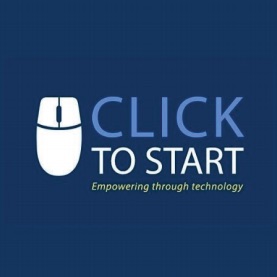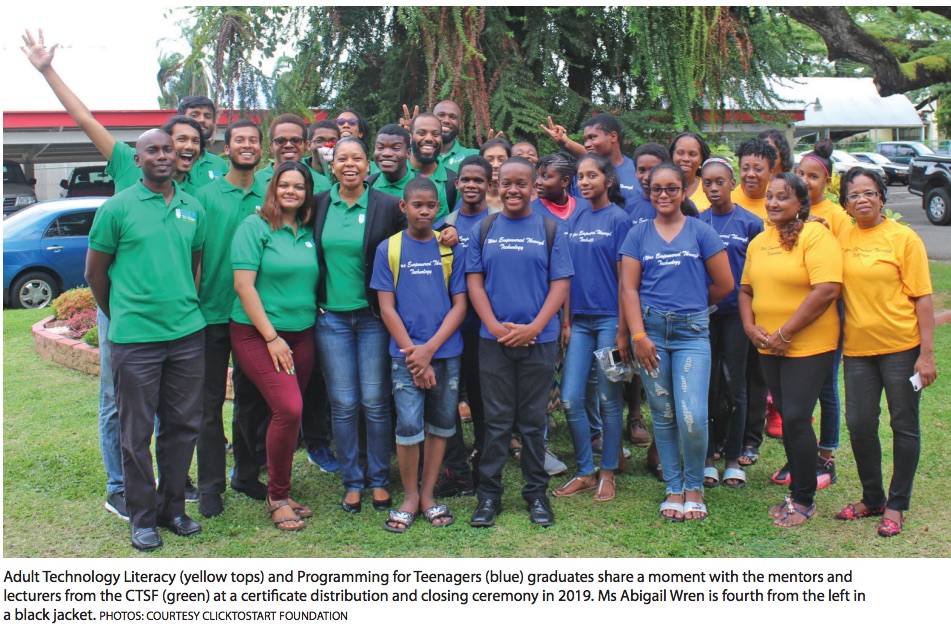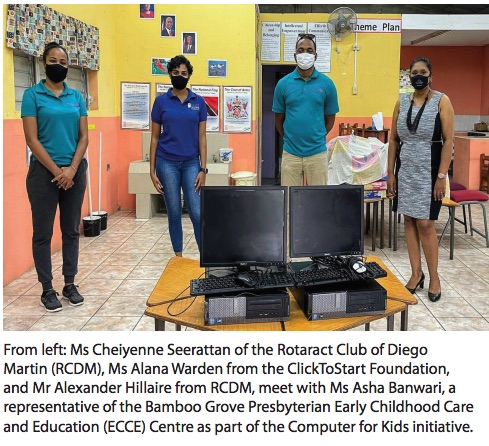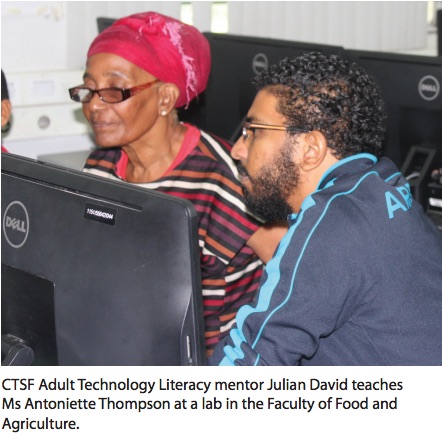Campus IT professional establishes ClickToStart Foundation to bridge the digital divide

In March 2020, as the world came to a halt, many of us turned to technology. From remote work to online classes, screens became our window to the rapidly changing world. As the pandemic stretched on, the effects of income inequality heightened, and access to phones, laptops and stable network connections became more vital than ever. Marginalised groups have disproportionately less access to these digital amenities.
For Abigail Wren and her project, ClickToStart Foundation (CTSF), their work in bridging the digital divide was crucial during lockdown periods. But Ms Wren’s journey in tech outreach goes much further back than COVID-19.
CTSF was established in 2013 by Ms Wren, a project manager and E-Learning specialist who works with UWI's IT department. The mission of the not-for-profit organisation is to provide training to help marginalised groups close the skills gap in the use of technology. CTSF focuses on offering training workshops to youths and senior citizens from various communities across Trinidad.

As a long-running series of projects, the work of the foundation is run entirely on volunteer time and expertise. The resources used to train and equip workshop participants are also entirely provided by the kindness and generosity of individual and corporate sponsors. From in-person classes assisting mature citizens in navigating the digital world to teaching programming to teens, the NGO has been finding ways to empower with technology.
“We try to make it as hands-on as possible,” says Ms Wren.
CTSF initially started with an Adult Technology Literacy (ATL) course created to close the knowledge gap between mature citizens and the digital world, introducing them to essential computer skills. Two founding members who helped to establish these classes were Julien David and Wade Guy.
The response was overwhelming, prompting their next foray, the Programming for Teens courses, idea of then volunteer, Marcus Sanatan. These courses helped youth from underserved communities, providing them with the support to learn Python programming – a technology used heavily by software developers. Students were introduced to core programming techniques, and the course culminated with them developing a working game. Not only were they shown that one could solve complex problems while having fun, but they were exposed to gaming, one of the most economically-viable industries globally.
With the onset of the pandemic, ClickToStart Foundation was faced with the challenge of not only going digital, but addressing the inequality in education for households without computer access.
While many students had access to some form of device to support online learning, certain students had devices that were not adequate for their areas of study. Others did not have access to any device at all. Ultimately, those without direct access either declined in their academics, or were forced to withdraw from classes completely.

CTSF pivoted their Programming for Teens during the early months of the pandemic and taught approximately 20 teenagers web development virtually over the 2020 summer holidays. They also embarked on another project, one in which they begun sourcing computers to assist students attend school online. This project is called Computers for Kids.
Naresh Seegobin, at the time a network administrator at UWI St Augustine’s Department of Computing and Information Technology (DCIT), was involved in sourcing some of the secondhand computers.
“Abigail asked around to find out who has computers that can be written off, which is The UWI’s process with any assets that are not functional anymore,” he explains.
The Computer for Kids project is a partnership with the Rotaract Club of Diego Martin and brainchild of Alana Warden, a CTSF volunteer and UWI alumni. An open call was made, and both private organisations and the public contributed towards computer donations. Financial contributions were used to buy computer parts, and pre-owned devices were either serviced, or scrapped for parts to refurbish others.
As mentioned, The UWI DCIT played a critical role in contributing devices for this drive, and also volunteered to assist with computer repairs, along with technicians from The UWI School of Education (SoE), Donald Matthews and Anton Brown.
The computers were distributed to students in need. When physical classes resumed, the distributions were extended to secondary schools to provide additional capacity to computer labs. In total, CTSF distributed over 100 hampers to needy families and delivered approximately 65 computers to 19 schools during the pandemic.
“I learned the different codes and commands on how to build a simple and easy computer game,” says Tyrese Pollydore, a past student of the Programming for Teenagers class of 2019 and recipient of a refurbished computer through the Computers for Kids Programme.

“The teachers there are motivated, communicable and fun workers, and they always find a way to help their students if needed.”
When asked to say what projects she is most pleased with, Ms. Wren said that, "graduating over 100 participants from our Adult Tech Literacy and Programming for Teens projects were two of my proudest moments so far." She added, "pivoting our classes in the pandemic to an online platform was also a wonderful recent achievement."
These and other projects were made possible by many solid partnerships and the generosity of many individual donations. The foundation has worked with various organisations and entities, on and off campus. These include the Office of the Deputy Principal (while under former Deputy Principal Professor Reddock), Campus IT Services, the Ministry of Community Development St George East Catchment, the Living Water Community, TTARP Chaguanas, and UWI faculties, staff, students and alumni.
Recently, the ClickToStart Foundation worked on the European Union and UWI STA YouthSpeakUp TT Project, where they assisted in curriculum development, recruitment and train the trainer, as well as management of the project’s website, social media and learning management system. This project runs from January 2021 to April 2023.
If you think you can help the foundation in any way, please reach out to clicktostartfoundation@gmail.com or check their website and Instagram pages.